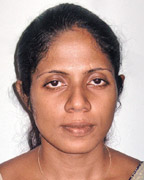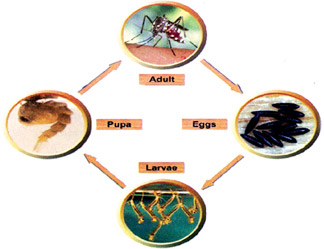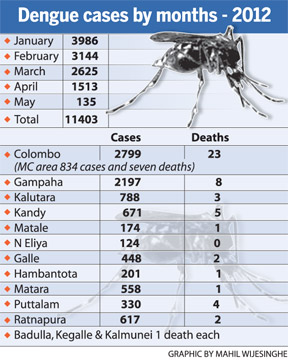New breeding pattern alarms public
* Dengue spreads near and far
* Leading schools, the main culprits
By Manjula FERNANDO
 |
 |
| Dr. Pradeep
Kariyawasam |
Apeksha
Warusawithana |
With the onset of the Monsoon season, fear of a looming dengue threat
is in the air of inevitable deaths, suffering and grieving of departed
loved ones.Dengue and rain shares a fatal bond. Recent newspaper reports
indicate that the dengue mosquito has altered its breeding patterns to
lay eggs in domestic wells and other new receptacles which has
heightened the fear double fold, especially parents with young kids.
Dengue is notorious to strike mainly the young.
The Sunday Observer visited the Medical Research Institute (MRI) and
the Colombo Municipal Council to verify these reports and clarify
certain grey areas for the benefit of our readers.
Consultant Virologist, MRI Dr. Sunethra Gunasena:
In Sri Lanka Dengue has become an endemic disease. Which means Dengue
has settled down for good in Sri Lanka. So you come across cases all the
time in fluctuating proportions. Dengue is transmitted by the mosquito,
intensive numbers of dengue cases have been reported during the rainy
season because mosquito breeding intensifies with the rain.
It is correct to say dengue cases go up during the monsoon season.
Earlier we had dengue cases only in big cities like Colombo and so on.
But now it is gradually spreading to the rural. That is because of the
spread of dengue mosquito who carry the virus with them.
In the cities, adolescents and children are already exposed to the
virus, may all four times and they are already immune to the disease. In
the village the virus is new to the environment, so you get patients of
all ages from infants to adults and the elderly, getting affected.
That is one reason for large number of dengue cases among adults in
the rural.
 We
were earlier concentrating on dengue as a disease of the children. So,
we were mostly concentrating on children. We
were earlier concentrating on dengue as a disease of the children. So,
we were mostly concentrating on children.
But due to new trends, which has begun spreading to rural areas, now
there are more and more adult cases getting reported. Current data as
against the late ‘90s shows that there is a definite peak in the adult
cases.
Early diagnosis
Unlike with children the problem with adults is that they tend to
neglect fever. They delay medical attention. This is dangerous in the
case of Dengue Haemmorhagic Fever (DHF). In the early stages you
observed a common fever.
When you get fever, it is necessary to be cautious and be alert for
other symptoms, and must go for a blood test within 3 days if the
symptoms are not so severe. If the symptoms are severe and the patient
looks weaker than normal, then medical advice should be sought earlier
than that, where doctors will start monitoring the blood count if Dengue
is suspected.
Do you have to wait for three days to do the blood test?
No. That is the ‘usual advice’ because during the very early stages
it is difficult to observe a big change in the blood count. By about the
third day there will be a distinctive change. But if the patient has
high fever and shows other complications like, heavy vomiting, and looks
seriously ill, then we should not keep the patient at home. But the
parents or the guardians should decide if the patient should be referred
to a doctor before that.
 With
any viral fever, rest is very vital. Physical activity like competitive
sports and exercise should be avoided. Nutrition and intake of liquids
during the first stage is important. After the initial stage of 2-3 days
patients should avoid coloured drinks. With
any viral fever, rest is very vital. Physical activity like competitive
sports and exercise should be avoided. Nutrition and intake of liquids
during the first stage is important. After the initial stage of 2-3 days
patients should avoid coloured drinks.
Patients with slight touch of Dengue fever could stay at home and
rest while the symptoms clear off. But those with DHF, the management of
the disease should be done by a professional medical staff in a
hospital. Therefore hospitalisation is a must.
If the blood counts are rapidly decreasing the doctor will decide if
the patient has to be admitted to hospital. If it is DHF, the doctors
will have to do the fluid management in addition to monitoring. The
purpose is to prevent the patient from developing severe DHF and go in
for a shock, at which stage fluid restrictions have to be made. But
before this stage a normal fluid intake can be maintained.
Special tests
The basic Dengue diagnosis is done by a blood count. But to identify
whether it is actually Dengue, there are special tests. There are
different methods to do it. We could either detect the Dengue virus, or
part of the Dengue virus, or dengue viral antibodies.
Usually we rely on Dengue antibodies, because the detection of
specific Dengue is not essential for the management.
It is important for surveillance and management of Dengue but not for
individual management. After about three days the body would have
developed antibodies to fight the virus.
If an early diagnosis is needed, then you will have to do a PCR
(Polymerase Chain Reaction) test. This is not done in hospitals but at
the MRI and private laboratories. We usually don’t recommend this
because of the high expenses involved.
The PCR and Dengue antigen can be done only during the first three
days. After 3-4 days the antibodies develop, which is a cheaper test.
 For
PCR and antigen tests you need to collect the samples specifically and
transport them in ice, which is a painstaking process. This is not
routinely done. For
PCR and antigen tests you need to collect the samples specifically and
transport them in ice, which is a painstaking process. This is not
routinely done.
PCR is useful to identify the stereotype of the virus. If it is
Dengue 1, 2, 3 or four. But as far as the patient management is
concerned, it is not useful. It is useful community wise for the
prevention and control.
Most critical factor in preventing deaths due to DHF is the
identification of the critical stage. When someone gets fever he should
be observed for at least 24 hours, even after the fever had subsided.
In some patients with DHF, the fever settles down when they proceed
to the next stage which is the critical phase. If the patient is still
feeling unfit, drowsy and continues to have loss of appetite, then it is
a cause for concern.
Fever with aches and pains, and loss of appetite are symptoms of
ordinary dengue fever but if the patient complaints of abdominal pain
and heavy vomiting, it could be possible symptoms of DHF. (Aches and
pains are synonymous even with an ordinary fever.)
It should also be noted that the time between the initial collection
of blood samples and referring to the reports to doctor should be
minimal if they suspect dengue. With Dengue fever, blood counts can come
down drastically within a short span of time, therefore if someone
suspect dengue, the reports should be collected and referred to doctors
as soon as possible. This could determine the difference of life and
death.
Rash - Dengue fever
Flushed hands, feet and face is a sign of dengue fever. A rash that
is similar to heat rash (prickly heat) could also develop due to dengue.
Not all dengue patients develop this rash.
DHF This rash is different from Dengue fever rash. You see red
patches under the skin. This may sometimes spread out like a bruising.
These are created by internal bleeding. If you press these spots they
will not disappear.
Apeksha Warusawithana, Research Officer, Entomology
Unit, MRI:
The recent newspaper reports that the Dengue mosquito has shown major
breeding adaptations has not been verified by our studies conducted so
far.
The reports said the dengue mosquitoes have started breeding in
domestic wells which alarmed people who had already been disturbed by
the increase in dengue cases within the first four months of this year.
We observed dengue larvae in wells in places like Eravur, Kalmunai in
the Eastern province but this does not mean that the mosquitoes have
started breeding in wells everywhere. The wells in these areas are
different from ordinary wells. Their surrounding surface is smooth from
the bottom. Dengue mosquito breeds in water collected in places where
there is a smooth wall like plastic containers.
Major breeding sites of dengue mosquito varies from area to area,
time to time and season to season. Discarded receptacles are the
predominant breeding sites in many districts of the country.
Clearing of places and home gardens have been very effective due to
the Government campaigns targeting the masses. But the blocked gutters
still poses a serious threat. We did not pay attention to this area
before. May be the mosquitoes have found a new breeding ground in
blocked gutters since the receptacles in the ground level are being
cleared now.
Our advice is to clean the gutters once every week or remove the
gutters in places where it is not very essential. Dengue is a bigger
threat than a wet wall.
She said leaf axils of plants like Bromelia and pineapple could be a
new breeding site of dengue since they have not found dengue larvae
during earlier inspections.
Colombo Municipal Council, Chief Medical Officer,
Dr. Pradeep Kariyawasam:
The Dengue cases have increased this year. If we don’t take immediate
action to get rid of the breeding places, there could be an outbreak
like last year.
Last Saturday we launched a program to visit from area to area to
destroy breeding sites. We are covering each and every road and creating
public awareness.
The high risk areas identified by the CMC are Slave Island,
Kollupitiya, Bambalapitiya, Thimbirigasyaya, Kirullapona, Maradana,
Dematagoda, Aluthkade and Grandpass.
We have to cover 120,000 residences and offices and 80,000 land
slots. With the limited staff it is humanely impossible for us to visit
all these places. Hence, it is vital that people look after their
residences. Ministries and public should join up in the city clean up
program to fight Dengue threat.
Schools are our key concern. Many leading schools in the city have
become dengue breeding places. According to statistics 70% of the Dengue
patients are under 20 years and 45% of the total dengue affected are in
the school-going age.
CMC has notified 25 schools within the city to clean up breeding
places, many of them are leading schools. Schools must really think of
clearing the garbage as well as blocked gutters and drains. I think
schools should go for a zero garbage policy, whatever the children bring
should be sent back home. Unless drastic measures are put in place this
dengue threat can never be controlled. |

